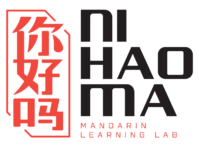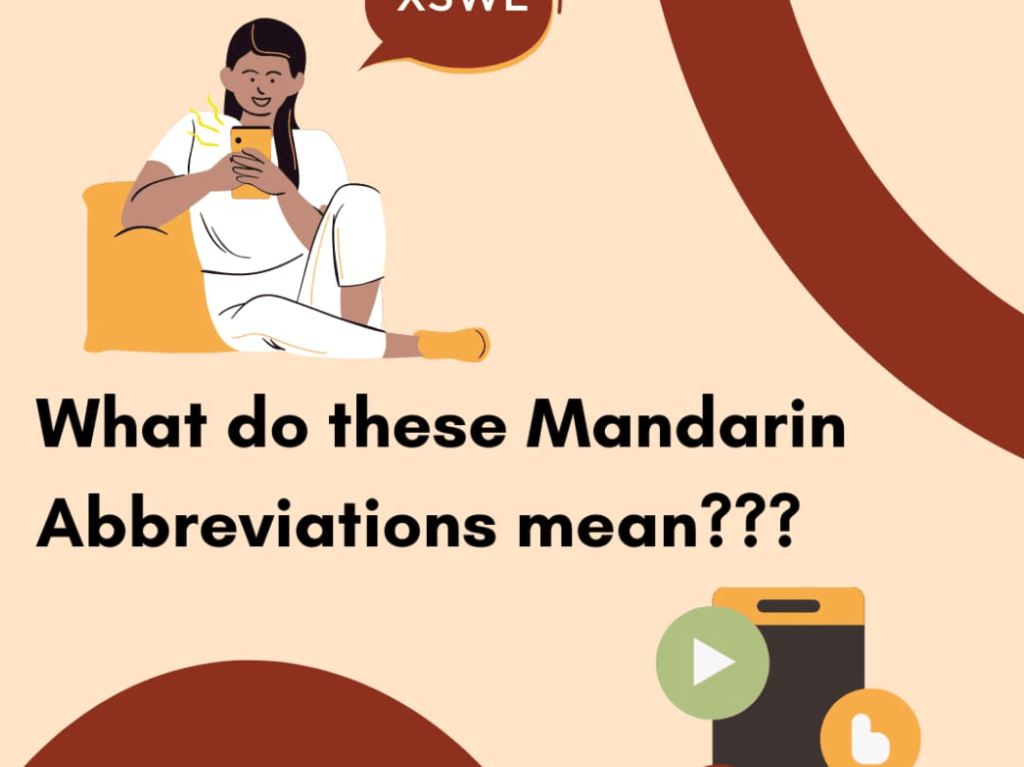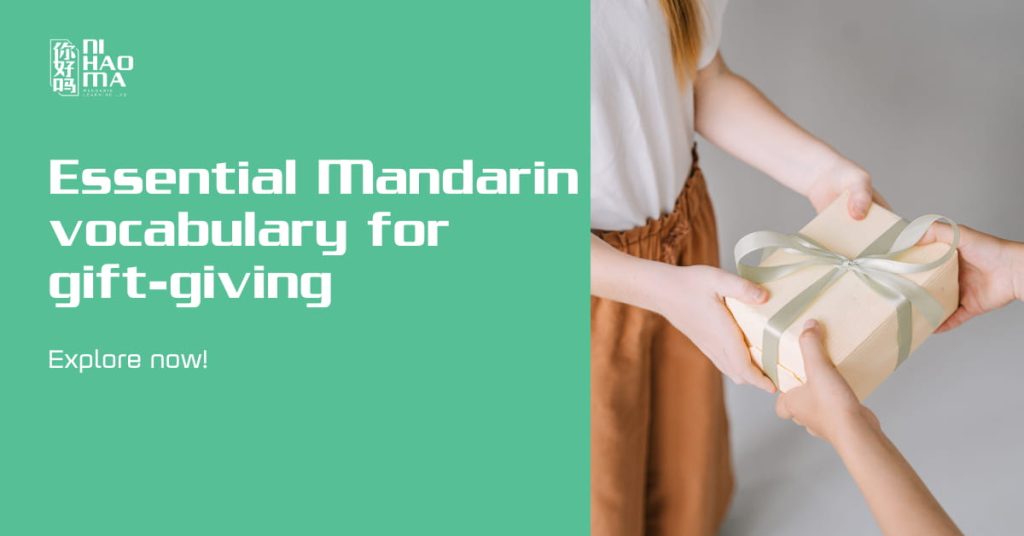Are you a travel enthusiast dreaming of exploring unique cultures in Chinese-speaking countries? To make your journey more complete and memorable, equipping yourself with Chinese vocabulary about traveling is essential. In this article, Ni Hao Ma provides you with key vocabulary and practical conversation examples to help you confidently communicate in any travel situation.
Chinese vocabulary about famous travel destinations in China
China is a vast country with thousands of years of history and world-renowned landmarks. Learning Chinese vocabulary related to popular tourist destinations not only enriches your language skills but also helps you travel more independently across China.
| Chinese | Pinyin | Meaning |
|---|---|---|
| 长城 | Chángchéng | Great Wall of China |
| 故宫 | Gùgōng | Forbidden City |
| 颐和园 | Yíhéyuán | Summer Palace |
| 天安门广场 | Tiān’ānmén Guǎngchǎng | Tiananmen Square |
| 兵马俑 | Bīngmǎyǒng | Terracotta Army |
| 黄山 | Huángshān | Yellow Mountain |
| 张家界 | Zhāngjiājiè | Zhangjiajie |
| 西湖 | Xīhú | West Lake (Hangzhou) |
| 苏州园林 | Sūzhōu yuánlín | Suzhou Classical Gardens |
| 九寨沟 | Jiǔzhàigōu | Jiuzhaigou Valley |
| 鼓浪屿 | Gǔlàngyǔ | Gulangyu Island |
| 上海外滩 | Shànghǎi Wàitān | The Bund (Shanghai) |
| 青海湖 | Qīnghǎi Hú | Qinghai Lake |
| 天山天池 | Tiānshān Tiānchí | Heavenly Lake (Tianshan) |
| 峨眉山 | Éméi Shān | Mount Emei |
| 乐山大佛 | Lèshān Dàfó | Leshan Giant Buddha |
| 南锣鼓巷 | Nánluógǔxiàng | Nanluoguxiang Alley |
| 凤凰古城 | Fènghuáng Gǔchéng | Phoenix Ancient Town |
| 云冈石窟 | Yúngāng Shíkū | Yungang Grottoes |
| 龙门石窟 | Lóngmén Shíkū | Longmen Grottoes |
| 南普陀寺 | Nánpǔtuó Sì | Nanputuo Temple |
| 大理古城 | Dàlǐ Gǔchéng | Dali Ancient City |
| 丽江古城 | Lìjiāng Gǔchéng | Lijiang Ancient Town |
| 上海迪士尼乐园 | Shànghǎi Díshìní Lèyuán | Shanghai Disneyland |
| 明十三陵 | Míng Shísānlíng | Ming Tombs |
| 天坛 | Tiāntán | Temple of Heaven |
| 北京环球影城 | Běijīng Huánqiú Yǐngchéng | Universal Studios Beijing |
| 白马寺 | Báimǎ Sì | White Horse Temple |
| 南京路 | Nánjīng Lù | Nanjing Road |
| 玉龙雪山 | Yùlóng Xuěshān | Jade Dragon Snow Mountain |
| 乌镇镇 | Wūzhènzhèn | Wuzhen Ancient Town |
| 成都大熊猫繁育研究基地 | Chéngdū dàxióngmāo fányù yánjiū jīdì | Chengdu Research Base of Giant Panda Breeding |
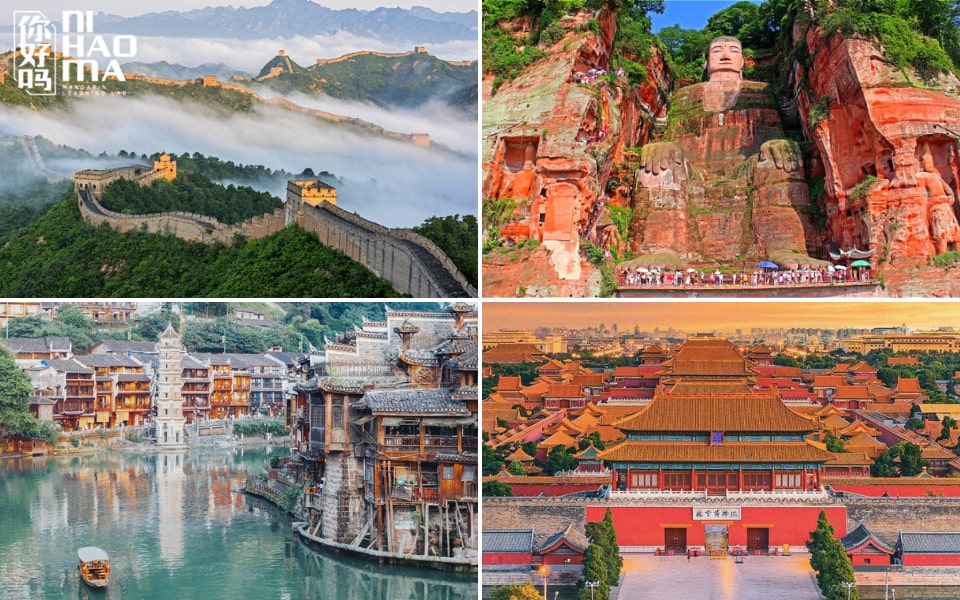
Chinese Vocabulary About Types of Travel
Understanding the various types of travel in Chinese can help you better describe your preferences and make plans with locals or travel agencies.
| Chinese | Pinyin | Meaning |
|---|---|---|
| 观光旅游 | guānguāng lǚyóu | Sightseeing travel |
| 休闲旅游 | xiūxián lǚyóu | Leisure travel |
| 探险旅游 | tànxiǎn lǚyóu | Adventure travel |
| 生态旅游 | shēngtài lǚyóu | Ecotourism |
| 文化旅游 | wénhuà lǚyóu | Cultural tourism |
| 商务旅游 | shāngwù lǚyóu | Business travel |
| 医疗旅游 | yīliáo lǚyóu | Medical tourism |
| 乡村旅游 | xiāngcūn lǚyóu | Rural tourism |
| 城市旅游 | chéngshì lǚyóu | Urban tourism |
| 海滨旅游 | hǎibīn lǚyóu | Coastal tourism |
| 山地旅游 | shāndì lǚyóu | Mountain tourism |
| 温泉旅游 | wēnquán lǚyóu | Hot spring travel |
| 户外旅游 | hùwài lǚyóu | Outdoor travel (camping, hiking) |
| 自驾游 | zìjià yóu | Self-driving tour |
| 背包游 | bēibāo yóu | Backpacking |
| 邮轮旅游 | yóulún lǚyóu | Cruise travel |
| 自由行 | zìyóuxíng | Independent travel (not in a group) |
| 跟团游 | gēntuányóu | Group travel (guided tour) |
| 宗教旅游 | zōngjiào lǚyóu | Religious/spiritual travel |
| 美食旅游 | měishí lǚyóu | Culinary tourism |
| 亲子游 | qīnzǐ yóu | Family travel (with children) |
| 蜜月旅游 | mìyuè lǚyóu | Honeymoon travel |
| 毕业旅行 | bìyè lǚxíng | Graduation trip |
| 独自旅行 | dúzì lǚxíng | Solo travel |
| 徒步旅行 | túbù lǚxíng | Hiking/trekking trip |
| 露营 | lùyíng | Camping |
Chinese Vocabulary About Traveling: Essential Travel Items
Knowing the Chinese vocabulary about essential travel items helps you communicate more easily when shopping, packing, or dealing with unexpected situations abroad.
| Chinese | Pinyin | Meaning |
|---|---|---|
| 行李 | xíngli | Luggage |
| 行李箱 | xínglǐxiāng | Suitcase |
| 背包 | bēibāo | Backpack |
| 钱包 | qiánbāo | Wallet |
| 现金 | xiànjīn | Cash |
| 证件 | zhèngjiàn | Personal documents |
| 护照 | hùzhào | Passport |
| 签证 | qiānzhèng | Visa |
| 身份证 | shēnfènzhèng | ID card |
| 机票 | jīpiào | Plane ticket |
| 火车票 | huǒchē piào | Train ticket |
| 车票 | chēpiào | Bus ticket |
| 手机 | shǒujī | Mobile phone |
| 充电器 | chōngdiànqì | Charger |
| 移动电源 | yídòng diànyuán | Power bank |
| 相机 | xiàngjī | Camera |
| 耳机 | ěrjī | Headphones |
| 银行卡 | yínhángkǎ | Bank card |
| 信用卡 | xìnyòngkǎ | Credit card |
| 地图 | dìtú | Map |
| 雨伞 | yǔsǎn | Umbrella |
| 墨镜 | mòjìng | Sunglasses |
| 防晒霜 | fángshàishuāng | Sunscreen |
| 洗漱用品 | xǐshù yòngpǐn | Toiletries |
| 毛巾 | máojīn | Towel |
| 牙刷 | yáshuā | Toothbrush |
| 牙膏 | yágāo | Toothpaste |
| 香皂 | xiāngzào | Soap |
| 洗发水 | xǐfàshuǐ | Shampoo |
| 沐浴露 | mùyùlù | Body wash |
| 梳子 | shūzi | Comb |
| 化妆品 | huàzhuāngpǐn | Cosmetics |
| 衣服 | yīfu | Clothes |
| 内衣 | nèiyī | Underwear |
| 鞋子 | xiézi | Shoes |
| 拖鞋 | tuōxié | Slippers |
| 帽子 | màozi | Hat |
| 外套 | wàitào | Jacket |
| 药品 | yàopǐn | Medication |
| 创可贴 | chuàngkětiē | Band-aids |
| 晕车药 | yùnchēyào | Motion sickness pills |
| 面巾纸 | miànjīnzhǐ | Tissues |
| 睡衣 | shuìyī | Pajamas/Pyjamas |
| 眼罩 | yǎnzhào | Sleep mask |
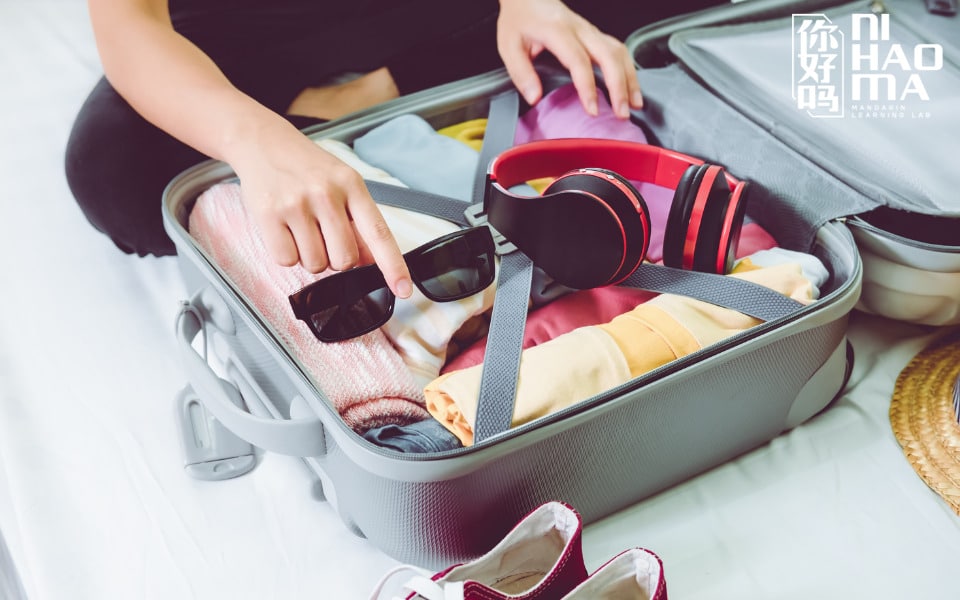
Chinese Vocabulary About Traveling: Travel Activities
Here is some useful Chinese vocabulary about travel activities to help you describe what you’re doing during your trips or ask about local experiences:
| Chinese | Pinyin | Meaning |
|---|---|---|
| 旅行 | lǚxíng | To travel |
| 出发 | chūfā | To depart |
| 订票 | dìng piào | To book tickets |
| 订酒店 | dìng jiǔdiàn | To book a hotel |
| 参观 | cānguān | To visit (a place) |
| 游览 | yóulǎn | Sightseeing |
| 拍照 | pāizhào | Take photos |
| 攀登 | pāndēng | Climb mountains |
| 划船 | huáchuán | Row a boat |
| 冲浪 | chōnglàng | Surfing |
| 游泳 | yóuyǒng | Swimming |
| 潜水 | qiánshuǐ | Diving |
| 购物 | gòuwù | Shopping |
| 逛街 | guàngjiē | Strolling around the city |
| 拍视频 | pāi shìpín | Record videos |
| 搭帐篷 | dā zhàngpéng | Pitch a tent |
| 露营 | lùyíng | Camping |
| 烧烤 | shāokǎo | BBQ |
| 看日出 | kàn rìchū | Watch the sunrise |
| 看日落 | kàn rìluò | Watch the sunset |
| 看风景 | kàn fēngjǐng | Enjoy the scenery |
| 骑自行车 | qí zìxíngchē | Ride a bicycle |
| 骑骆驼 | qí luòtuó | Ride a camel |
| 坐缆车 | zuò lǎnchē | Take a cable car |
| 上香祈福 | shàngxiāng qífú | Burn incense and pray |
| 晒太阳 | shài tàiyáng | Sunbathe |
| 问路 | wènlù | Ask for directions |
| 租车 | zūchē | Rent a car |
| 钓鱼 | diàoyú | Go fishing |
| 滑雪 | huáxuě | Skiing |
| 溜冰 | liūbīng | Ice skating |
| 采摘水果 | cǎizhāi shuǐguǒ | Fruit picking |
| 体验温泉 | tǐyàn wēnquán | Experience hot springs |
Chinese Vocabulary About Traveling
| Chinese | Pinyin | Meaning |
|---|---|---|
| 游客 | yóukè | Tourist |
| 导游 | dǎoyóu | Tour guide |
| 景点 | jǐngdiǎn | Tourist attraction |
| 行程 | xíngchéng | Itinerary |
| 签证 | qiānzhèng | Visa |
| 时差 | shíchā | Time difference |
| 航班 | hángbān | Flight |
| 机场 | jīchǎng | Airport |
| 入境 | rùjìng | Entry |
| 出境 | chūjìng | Exit |
| 酒店 | jiǔdiàn | Hotel |
| 飞机 | fēijī | Airplane |
| 火车 | huǒchē | Train |
| 汽车 | qìchē | Car |
| 预订 | yùdìng | Reservation |
| 座位 | zuòwèi | Seat |
| 安全带 | ānquándài | Seatbelt |
| 行李 | xíngli | Luggage |
| 导航 | dǎoháng | Navigation |
| 前台 | qiántái | Front desk |
| 房卡 | fángkǎ | Room card |
| 单人间 | dānrénjiān | Single room |
| 双人间 | shuāngrénjiān | Double room |
| 退房 | tuìfáng | Check out |
| 入住 | rùzhù | Check in |
| 城市 | chéngshì | City |
| 村庄 | cūnzhuāng | Village |
| 交通 | jiāotōng | Transportation |
| 火车站 | huǒchēzhàn | Train station |
| 地铁 | dìtiě | Subway |
| 巴士 | bāshì | Bus |
| 出租车 | chūzūchē | Taxi |
| 美食 | měishí | Cuisine |
| 点菜 | diǎncài | Order food |
| 休息 | xiūxi | Rest |
| 售票处 | shòupiàochù | Ticket counter |
| 名胜古迹 | míngshèng gǔjì | Famous historical site |
| 自然保护区 | zìrán bǎohùqū | Nature reserve |
| 博物馆 | bówùguǎn | Museum |
| 游乐园 | yóulèyuán | Amusement park |
| 动物园 | dòngwùyuán | Zoo |
| 度假村 | dùjiàcūn | Resort |
| 夜市 | yèshì | Night market |
| 步行街 | bùxíngjiē | Pedestrian street |
| 遗址 | yízhǐ | Historical ruins |
You might be interested in: Chinese Vocabulary About Transportation
Sample Conversations Using Chinese Vocabulary About Traveling
When you’re traveling in China or speaking Chinese about your travel plans, you’ll often need to ask for directions, book hotels, recommend destinations, or describe your itinerary. Practicing with real-life dialogues helps you use the vocabulary more naturally and communicate more fluently.
Conversation 1: Booking a Hotel Room
A: 你好,我想预订一个房间。
Nǐ hǎo, wǒ xiǎng yùdìng yí ge fángjiān.
Hello, I’d like to book a room.
B: 请问,您要订哪一天的?
Qǐngwèn, nín yào dìng nǎ yì tiān de?
May I ask, which date would you like to book?
A: 8月10号到12号。
Bā yuè shí hào dào shí’èr hào.
From August 10 to August 12.
B: 需要单人间还是双人间?
Xūyào dānrénjiān hái shì shuāngrénjiān?
Do you need a single or double room?
A: 双人间,有窗户的吗?
Shuāngrénjiān, yǒu chuānghu de ma?
Double room — does it have a window?
B: 有的,含早餐,每晚680元。
Yǒu de, hán zǎocān, měi wǎn liù bǎi bāshí yuán.
Yes, with breakfast included. 680 yuan per night.
A: 好的,我要订一间。
Hǎo de, wǒ yào dìng yì jiān.
Okay, I’ll take one room.
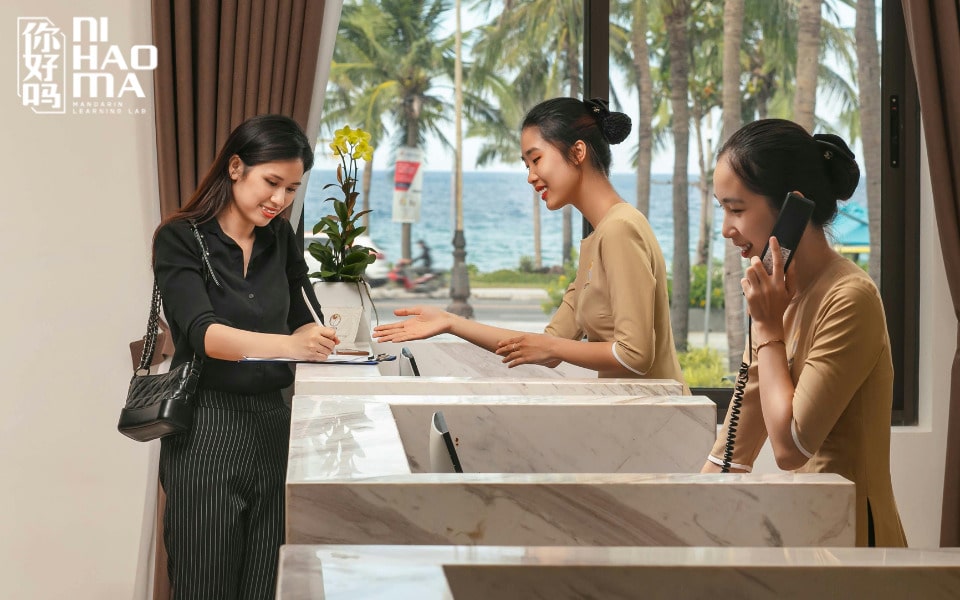
Conversation 2: Asking for Directions to a Tourist Site
A: 请问,故宫怎么走?
Qǐngwèn, Gùgōng zěnme zǒu?
Excuse me, how do I get to the Forbidden City?
B: 你现在在天安门广场吗?
Nǐ xiànzài zài Tiān’ānmén Guǎngchǎng ma?
Are you currently at Tiananmen Square?
A: 对,我在这儿。
Duì, wǒ zài zhèr.
Yes, I’m here.
B: 那就很近了,走路大约十分钟。
Nà jiù hěn jìn le, zǒulù dàyuē shí fēnzhōng.
It’s very close, about a 10-minute walk.
A: 一直走,看到大门就是故宫。
Yìzhí zǒu, kàndào dàmén jiù shì Gùgōng.
Just walk straight, and you’ll see the main gate — that’s the Forbidden City.
B: 好的,谢谢您!
Hǎo de, xièxie nín!
Great, thank you very much!
Summary
Learning Chinese vocabulary about traveling through common topics makes it more enjoyable and easier to remember. Mastering key words and practical travel dialogues is a great first step toward having a smooth and enriching trip in Chinese-speaking countries. We hope the knowledge shared by Ni Hao Ma in this guide becomes a helpful companion on your journey.
